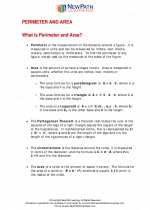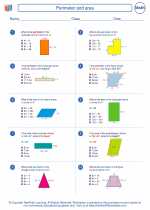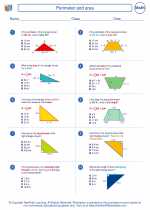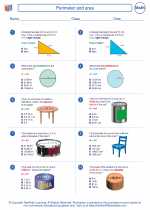Perimeter and area -> experiments
Experiments Study Guide
What is an Experiment?
An experiment is a scientific procedure undertaken to make a discovery, test a hypothesis, or demonstrate a known fact. It involves the manipulation of variables to observe the effects and outcomes.
Types of Experiments
Controlled Experiments
In a controlled experiment, one variable is changed while all other variables are kept constant. This allows for the observation of the specific impact of the manipulated variable.
Randomized Experiments
In randomized experiments, the subjects or participants are randomly assigned to different groups, which helps to minimize the effects of confounding variables.
Blind Experiments
In blind experiments, the participants are unaware of certain information, such as whether they are receiving a treatment or a placebo. This helps to reduce bias in the results.
Double-Blind Experiments
In double-blind experiments, both the participants and the researchers are unaware of certain details, such as who is receiving the treatment and who is in the control group. This further reduces bias and ensures objectivity.
Key Concepts in Experiments
Variables
In an experiment, there are independent variables (the ones being manipulated) and dependent variables (the ones being measured). It's important to identify and control these variables to ensure the validity of the results.
Hypothesis
A hypothesis is a testable prediction about the outcome of an experiment. It serves as a guide for the experiment and provides a basis for making conclusions.
Experimental Design
The design of an experiment includes the selection of appropriate methods, controls, and statistical analyses. A well-designed experiment minimizes bias and confounding factors.
Study Tips for Experiments
- Understand the purpose of the experiment and the variables involved.
- Practice identifying independent and dependent variables in different scenarios.
- Learn about the different types of experimental designs and their applications.
- Work on formulating hypotheses and understanding their role in experiments.
- Review examples of controlled, randomized, blind, and double-blind experiments.
By mastering the concepts and types of experiments, you'll be well-prepared to understand and conduct scientific inquiries with confidence.
[Experiments] Related Worksheets and Study Guides:
.◂Math Worksheets and Study Guides Eighth Grade. Perimeter and area

 Worksheet/Answer key
Worksheet/Answer key
 Worksheet/Answer key
Worksheet/Answer key
 Worksheet/Answer key
Worksheet/Answer key
 Worksheet/Answer key
Worksheet/Answer key
